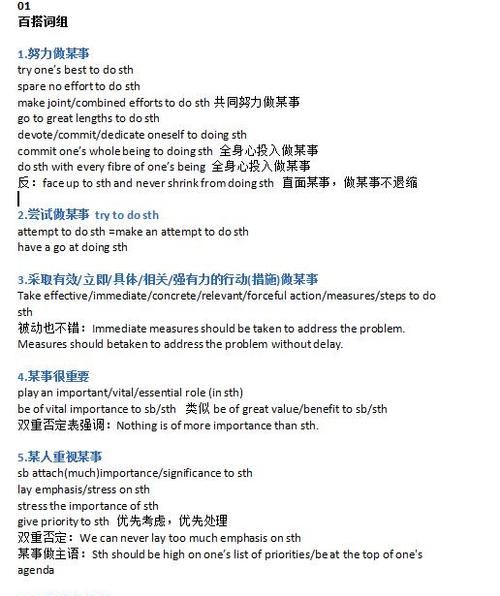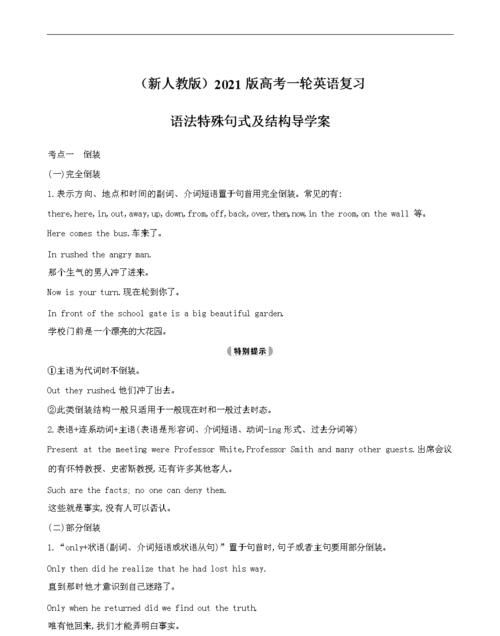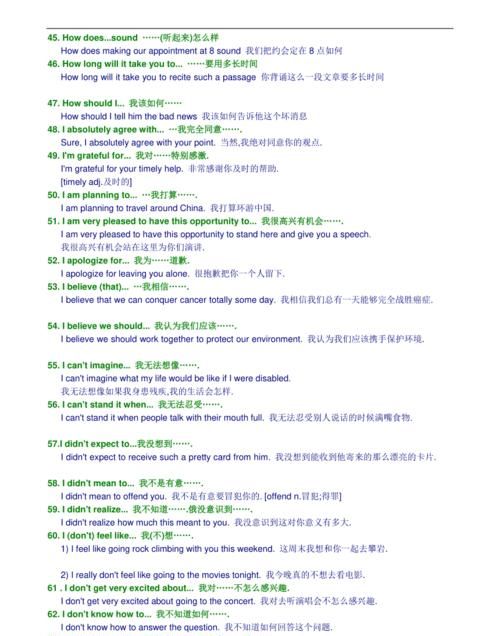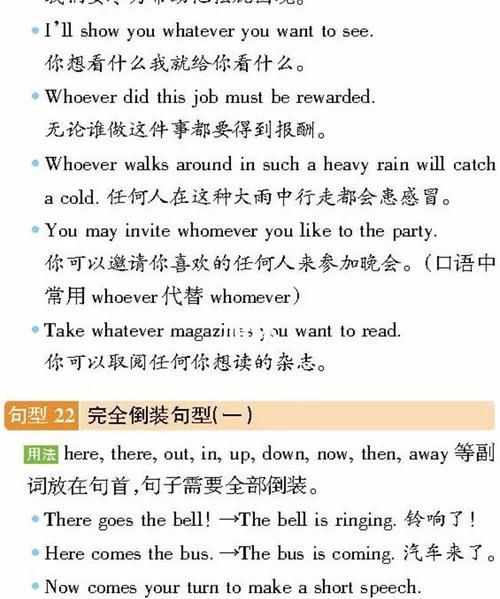本文目录
高考宾语从句语法填空
形式宾语与宾语补语句型:
(1) 形式宾语代动词不定式
例: I think it necessary to explore the space. 我认为探索太空是有必要的。
(2) 形式宾语代从句
例: They found it strange that no one would take the money.
他们感到很奇怪谁也不要这一笔钱。
(3) 过去分词做宾语补语表示宾语被动的动作:例: I had my pen stolen. 我的笔被偷了。
(4) 现在分词做宾语补语表示宾语正在进行的动作。
例: They found her lying in bed reading a novel.
他们发现她躺在床上看小说。
(5) 以名词(间或可用代词)作宾语补足语:
例 : In 1849, he went to England and made London the base for his revolutionary work.
1849年他到了英国,并且把伦敦作为他的革命工作的基地。
I think him an honest man.我认为他是一个诚实的人。
(6) 介词短语做宾语补语:如:
例 : I can't find him in the office. 我在办公室外没有发现他。
(7) What do you find the hardest in... 你觉得 最大的困难是什么例句: What do you find the hardest in learning English
你觉得学英语最大的困难是什么

小高考英语作文万能句
一.开头句型
1.As far as ...is concerned 就……而言 比如说:就我而言 As far as I concerned
2 It can be said with certainty that... +从句 可以肯定地说......
3.As the proverb says, 正如谚语所说的, 可以用来引用名言名句
4 .It has to be noticed that... 它必须注意到,...
5 .It's generally recognized that... 它普遍认为...
6 .It's likely that ... 这可能是因为...
7 .It's hardly that... 这是很难的......
8 There's no denying the fact that...毫无疑问,无可否认
9 .Nothing is more important than the fact that... 没有什么比这更重要的是…
10 .what's far more important is that... 更重要的是…
二.衔接句型
1.A case in point is ... 一个典型的例子是...
3 But the problem is not so simple. Therefore,+句子 ( 然而问题并非如此简单,所以……)
4 .But it's a pity that... 但遗憾的是… it’s a pity that….遗憾的是。。。
5 In spite of the fact that...尽管事实...... In spite of 尽管
6 .Further, we hold opinion that... 此外,我们坚持认为,...
7 .However , the difficulty lies in..+名词或者动名词 .然而,困难在于…
8.Similarly, we should pay attention to... 同样,我们要注意...
9 As it has been mentioned above...正如上面所提到的… (可以用来对前面所说的话进行补充说明)
10.In this respect, 从这个角度上
11.However, 然而…
三.结尾句型
1.I will conclude by saying... 最后我要说…
2.Therefore, we have the reason to believe that...因此,我们有理由相信…
3.All things considered,总而言之 = In a word=In conclusion
It may be safely said that...它可以有把握地说......
4.Therefore, in my opinion,因此,在我看来,
5.From what has been discussed above, we may safely draw the conclusion that….通过以上讨论,我们可以得出结论…
6.The data/statistics/figures lead us to the conclusion that….通过数据我们得到的结论是,....
7.It can be concluded from the discussion that...从中我们可以得出这样的结论
8.From my point of view, it would be better if...在我看来,如果……也许更好
四.举例句型
(一)段首句
一、图表作文框架
As is shown by the figure/percentage in the table(graph/picture/pie/chart) has been on rise/ decrease (increases/drops/decreases),有表格或图像可以看出。。。 significantly/dramatically/steadily rising/decreasing from______ in _______ to ______ in _____. From the sharp/marked decline/ rise in the chart, it goes without saying that 毫无疑问的看出_______.
There are at least two good reasons accounting for 这里至少有两个原因可以对 X X 作出解释. On the one hand, _一方面_____. On the other hand, ______ is due to the fact that ________. 另一方面---的原因是。。。In addition, 而且_______ is responsible for _______. Maybe there are some other reasons to show _也许有其他原因要展示_______. But it is generally believed that the above mentioned reasons are commonly convincing. As far as I am concerned, I hold the point of view that _______. I am sure my opinion is both sound and well-grounded.
二、书信作文模板
Dear X X X, 亲爱的X X X
I am extremely pleased to hear from you.(我很高兴收到你的来信) And I would like to write a letter to tell you that_____. (我很高兴写封信告诉你。。。) I will greatly appreciate a response from you at your earliest convenience/I am looking f0rward to your replies at your earliest convenience. (我希望你可以在空闲的时候尽快给我回信)
Best regards for your health and success. 祝你身体健康万事如意
Sincerely yours,你最真诚的X X X
X X X
三、话题作文
Nowadays现在, there are more and more __ _ in +名词 _. 在。。。反面有越来越多的。。。It is estimated that ___. 据估计。。。Why have there been so many ____?为什么有这么多。。。 Maybe the reasons can be listed as follows. 也许原因如下。。。 The first one is ______. 第一个原因是。。。Besides,而且。。。_____. The third one is _____. 第三个原因是。。。To sum up总之, the main cause of it is due to _____.最主要的原因是由于。。。 It is high time that something were done upon it是时候我们来改善它了. For one thing,一方面我们可以做。。。_____. For another thing, _____另一方面我们可以。。。. All these measures will certainly reduce the number of _____. 所有的这些措施都可以确切的减少。。。
推荐用于写保护环境,爱护动物等作文
四、对比观点作文
(1) 要求论述两个对立的观点并给出自己的看法。 1. 有一些人认为。。。 2. 另一些人认为。。。3. 我的看法。。。
The topic of +名词或者动名词或者名词性从句is becoming more and more popular recently.最近* *话题已经越来越受热议 There are two sides of opinions about it. 关于这个话题有两方面的观点Some people say A is their favorite.一些人说A观点是他们最支持的 They hold their view for the reason of ②-----------------(支持A的理由是一)What is more, ③------------并且理由二是。。。). Moreover, ④---------------(还有理由三是).
While others think that B is a better choice in the following three reasons.(其他一些人认为在以下三个原因下B观点是更好的选择) Firstly,-----------------(首先支持B的理由一). Secondly (besides),⑥------------------(其次理由二是). Thirdly (finally),⑦------------------(最后理由三是).
From my point of view,以我而言 I think ⑧----------------(我认为我的观点是). The reason is that+从句 ⑨--------------------(我的原因是). As a matter of fact,事实上 there are some other reasons to explain my choice.还有一些其他的原因可以解释我的选择 For me,对我而言 the former is surely a wise choice . 前者的选择确实很明确
Some people believe that ①---------一些人相信). For example,例如 they think+从句 ②他们认为。。。).And it will bring them ③-----------------( 。。。为他们带来。。。的好处).
In my opinion,在我看来 I never think this reason can be the point我从没想过这些是支持。。。的原因. For one thing,④-------------(我不同意该看法的理由一). For another thing, ⑤-----------------(我反对的理由之二).
Form all what I have said,根据以上我所说的 I agree to the thought that ⑥------------------(我同意。。。的观点)
五、阐述主题题型
要求从一句话或一个主题出发,按照提纲的要求进行论述. 1. 阐述名言或主题所蕴涵的意义. 2. 分析并举例使其更充实.
The good old proverb ----------------(名言或谚语)reminds us that ----------------(释义). 古老的名言谚语告诉我们。。。Indeed,的确,确实 we can learn many things form it. 我们可以从那些名言学到很多东西
First of all,-----------------(首先我们可以学到。。。). For example, -------------------(例如。。。). Secondly,----------------(第二我们可以学到). Another case is that ---------------(举例说明).另一个例子为。。。 Furthermore , 并且------------------(理由三).
六、解决方法题型
要求考生列举出解决问题的多种途径 1. 问题现状

高中英语常考句型
高中英语:高考英语常考60个句型+例句
高中英语入门超级重要的60个句型,附有例句,不爱记语法理论的同学,一定要多背自己不熟悉的句式。
1. as…as 和……一样
中间必须用形容词或副词原级。例如:
This classroom is as big as that one.
这间教室和那间一样大。
He runs as fast as Tom.
他和汤姆跑的一样快。
否定结构:not as/so…as,“不如……”。上面的两个句子可分别改为:
This classroom is not as/so large as that one.
这间教室不如那间大。
He doesn’t run as/so fast as Tom.
他跑得不如汤姆快。
2. as soon as 一……就……
用来引导时间状语从句。若主句是一般将来时,从句要用一般现在时。例如:
I’ll tell him the plan as soon as I see him.
我一看到他就告诉他这个计划。
He’ll go home as soon as he finishes his work.
他一完成工作就回家。
3. be busy/enjoy/hate/go on/finish doing sth. 忙于/喜欢/讨厌/继续/完成做某事
在enjoy, finish, hate, go on, be busy等词语后,一般用动词-ing形式作宾语。例如:
Lin Tao is busy making a model plane.
林涛正忙着做飞机模型。
My mother enjoys taking a walk after supper.
我妈妈喜欢晚饭后散步。
I hate watching Channel Five.
我讨厌看五频道。
When someone asked him to have a rest, he just went on working.
当有人让他休息一会儿时,他仍继续工作。
I have finished writing the story.
我已经写完了故事。
4. fill…with 用……装满......;be filled with 充满了……;be full of 充满了......
①be filled with 说明由外界事物造成的此种状态,表示被动。例如:
The box is filled with food.
盒子里装满了食物。
②be full of说明主语处于的状态。此外,还可表示程度,意为“非常”。例如:
The patient’s room is full of flowers.
那个病人的房间摆满了花。
The young man is full of pride.
那个年轻人非常骄傲。
③这两种结构还可以相互改写。例如:
I fill the box with food. The box is full of food.
5. be good/bad for 有利于/有害于……
此句型是:be+adj.+for+n.结构。例如:
Doing morning exercises is good for your health.
做早操对你的健康有益。
Always playing computer games is bad for your study.
总玩电脑游戏对你的学习不利。
6. be used to(doing) sth. 习惯于……
后必须接名词或动名词,可用于现在、过去、将来的多种时态。be 可用get,become来代替。例如:
He is used to life in the country.(He is used to living in the country.)
他习惯于乡村生活。
He will get used to getting up early.
他将会习惯于早起。
注意:be used to do 的意思是“被用来做……”。例如:
Wood is used to make paper.
木材被用来造纸。
7. both…and…两者都……
用来连接两个并列成分;当连接两个并列主语时,其后谓语动词用复数。例如:
Both the students and the teachers will go to the History Museum tomorrow.
不论老师还是学生明天都会去历史博物馆。
8. can’t help doing sth. 禁不住做某事
help在此的意思是“抑制,忍住”,其后接动词-ing形式。例如:
His joke is too funny. We can’t help laughing.
他的笑话太有趣了,我们禁不止笑了起来。
9. sth. costs sb. some money 某物花费某人多少钱
此句型的主语是物。cost一词带的是双宾语,它的过去式、过去分词和原型一样。
This book cost me five yuan.
这本书花了我五元钱。
10. either…or… 不是……就是……,或者……或者……
用来连接两个并列成分,当连接并列主语时,谓语动词与邻近的主语保持一致。
You may either stay here or go home.
你可以呆在这儿,也可以回家。
Either she or I am right. = Either I or she is right.
不是她对就是我对。
11. enough (for sb.) to do sth. 足够……做……
在此结构中,for用来引出不定式的逻辑主语。例如:
The ice isn’t thick enough for you to walk on.
这冰还没有厚到你可以在上面走的程度。
12. feel like doing sth. 想要做……
此处like为介词,后面跟动词-ing形式。此句型与would like to do sth.同义。例如:
I feel like drinking a cup of milk.
我想喝一杯牛奶。
13. feel/find/think it adj./n. to do sth. 认为某事……
在此结构中it为形式宾语,不定式短语作真正的宾语。例如:
I find it very interesting to play football.
我发现踢足球很有趣。
She thinks it her duty to help us.
她认为帮助我们是她的职责。
14. get ready for sth./to do sth.
get ready for sth.意为“为某事做准备”;get ready to do sth.意为“准备做某事”例如:
We are getting ready for the meeting.
我们正在为会议做准备。
They were getting ready to have a sports meet at that moment.
他们那时正准备开运动会。
15. get/receive/have a letter from 收到……的来信,相当于hear from
Did you receive a letter from John?
你收到约翰的来信了吗?
I got a letter from my brother yesterday.
我昨天收到了我弟弟的一封来信。
16. had better (not) do sth. 最好(别)做某事
had better为情态动词,其后需用动词原形。had better常用缩写,变成’d better,其否定形式是在其后直接加not。例如:
We had better go now. = We’d better go now.
我们最好现在走吧。
You’d better not go out because it is windy.
今天刮风,你最好别出去了。
17. have sth. done 使(某事)完成 (动作由别人完成)
sth.为宾语,done为过去分词作补语。例如:
We had the machine repaired.
我们请人把机器修好了。
注意区分:We have repaired the machine. 我们(自己)已经修好了机器。
18. help sb. (to) do sth./with sth. 帮助某人(做)某事,其中的to可以省略。例如:
I often help my mother with housework.
我常常帮助妈妈做家务。
Would you please help me (to) look up these words?
请你帮助我查查这些词好吗?
19. How do you like……? 你认为……怎么样?与what do you think of …?同义。例如:
How do you like the weather in Beijing?
你认为北京的天气怎么样? 你觉得这部新电影如何?
20. I don’t think/believe that… 我认我/相信……不……
其中的not是对宾语从句进行否定而不是对主句否定(否定前移)。that可省略。例如:
I don’t think it will rain.
我认为天不会下雨。
I don’t believe the girl will come.
我相信那女孩不会来了。
21. It happens that… 碰巧…… 相当于happen to do,例如:
It happened that I heard their secret.
可改写为:I happened to hear their secret
我碰巧听到了他们的秘密。
22. It’s/has been +一段时间+since从句 自从某时起做某件事情已经一段时间了
该句型中since引导的时间状语从句常用一般过去时。例如:
It’s twenty years since he came here.
他来这里已经20年了。
It has been six years since he married Mary.
他和玛丽结婚已经六年了。
23. It is +adj./n. + for sb. to do sth. 做某事对某人来说……
It是形式主语,真正的主语是不定式to do sth。例如:
It’s not easy for us to study English well.
对我们来说学好英语并不容易。
It’s a good idea for us to travel to the south.
去南方旅行对我们来说是个好主意。
24. It’s + adj. + of sb. to do sth.
It是形式主语,to do sth.是真正的主语, 当表语(即形容词)能对逻辑主语描述时,常用介词of,而不用for。例如:
It’s very polite of you to give your seat to old people.
你给老人让座,非常有礼貌。
25. It seems/appears (to sb) that… (在某人看来)好像……
此句中的it是主语,that引导的是表语从句。例如:
It seems that he is lying.
看样子他好像是在撒谎。
It appears to me that he never smiles.
在我看来,他从来没有笑过。
26. It is +数词+metres/kilometers long/wide… ……是多少米(公里)长(宽)
用来表示物体的长(宽,高),如数词大于一,名词要用复数。例如:
It is 20 metres long from this end to that end.
从这端到那端有二十米长。
27. It’s time for sb. to do sth. 是某人干某事的时候了
it是形式主语,真正的主语是动词不定式to do sth. 例如:
It’s time for the child to go to bed.
孩子该睡觉了。
比较下面两种结构:
① It’s time for + n. 例如:
It’s time for school.
②It’s time to do sth. 例如:
It’s time to go to school.
28. It takes sb. some time to do sth. 花费某人多少时间做某事
it是形式主语,真正的主语是动词不定式to do sth。例如:
It takes her fifteen minutes to walk to the bus stop from here.
从这儿走着到公交车站将花费她15分钟。
It took the old man three days to finish the work.
那个老人花了三天时间完成这项工作。
29. keep (on) doing sth. 一直坚持做某事
keep doing sth.一般用于静态动词。keep on doing sth.意为“继续不停地做某事”,一般用于动态动词,但二者的区别并不是很严格,有时可以互换。例如:
Don’t keep on doing such foolish things.
不要再做这样的傻事了。
He kept sitting there all day.
他整天坐在那里。
30. keep…from doing sth. 阻止......做某事
相当于stop…from doing sth., prevent…from doing sth. 在主动句中,stop和prevent后面的from可以省略,但在被动结构中,from不可以省略。例如:
Please keep the children from swimming in the sea.
请别让孩子到海里游泳。
The big noise outside my room stopped me from doing my homework.
屋外巨大的噪音使我不能做作业。
31. keep sb. doing sth. 让某人一直做某事
不可和keep sb.from doing sth.结构混淆。例如:
Why do you keep me waiting for a long time?
你为什么让我等了很长时间?
32. make sb. do sth. 使某人干某事
make意为“使”时,其后要有不带to的动词不定式。例如:
He made me work ten hours a day.
他让我每天工作10小时。
注意:上句如改为被动语态,则work 前的to不能省略。例如:
I was made to work ten hours a day.
33. neither…nor… 既不……也不……
当连接两个并列主语时,谓语动词与邻近的主语取得一致(就进一致原则)。例如:
Neither we nor Jack knows him.
我们和杰克都不认识他。
He neither knows nor cares what happened.
他对发生的事情不闻不问。
34. not…until… 直到……才......
until后可跟名词或从句,表示时间。例如:
He didn’t come until late in the evening.
他直到晚上很迟才来。
He didn’t arrive until the game began.
直到比赛开始他才来。
35. sb. pays money for sth. 某人花钱买某物
此句型主语是人。例如:
I’ve already paid 2,000 yuan for the motor bike.
我已经花了2000元买这辆摩托车。
36. spend time/money on sth./(in)doing sth. 花费(时间、钱)在某事上/做某事
其中in可以省略,通常主语为“人”。例如:
I spent five yuan on this book.
我在这本书上花了五元钱。
I spent two hours (in) doing my homework yesterday.
昨晚我花了两个小时做作业。
37. so…that… 太……以至于……
用于复合句,that引导的是结果状语从句。so是副词,后面应接形容词或副词,如果接名词,应用such。例如:
The ice is so thin that you can’t walk on it.
冰太薄了,你不能在上面走。
He is such a kind man that we all like him.
他是一个非常好的人,我们都很喜欢他。
38. stop to do sth., stop doing sth.
stop to do sth. 意为“停下来去做另一件事”,stop doing sth.意为“停止正在做的事”例如:
You’re too tired. You’d better stop to have a rest.
你们太累了,最好停下来休息一会儿。
The teacher is coming. Let’s stop talking.
老师来了,咱们别说话了。
39. Thank you for doing sth. 感激你做了……
for之后除了加动名词doing外,还可以加名词。例如:
Thank you for giving me the present.
谢谢你给我的礼物。
Thank you for your help. =Thank you for helping me.
谢谢你的帮助。
40. thanks to 多亏……,由于……
thanks后的s不能省略,to是介词。例如:
Thanks to my friend Jim, I’ve worked out this problem.
多亏了我朋友吉姆的帮助,我已经解决了这个问题。
41. There be句型
①在此结构中,there是引导词,在句中不能充当任何成分,也不必翻译出来。句中的主语是某人或某物,谓语动词be要与主语的数保持一致。例如:
There is a man at the door.
门口有一个人。
当主语是由两个或者两者以上的名词充当时,谓语动词be要跟它邻近的那个名词的数一致(就近一致)。例如:
There are two dogs and a cat under the table.
桌下有两只狗和一只猫。
比较:There is a cat and two dogs under the table.
②There be 句型中的be不能用have来代替,但可以用lie(位于,躺),stand(矗立),exist(生存),live(生活)等词来替换。例如:
There stand a lot of tall buildings on both sides of the street.
街道两旁矗立着许多高楼。
There lies lake in front of our school.
我们学校前面有一个湖。
Once there lived a king here.
这儿曾经有一个国王。
There is going to be a sports meeting next week.
下周准备开一个运动会。
there be 的拓展结构:there seem(s)/happen(s) to be…
There seems to be one mistake in spelling.
似乎有一处拼写错误。
There happened to be a ruler here.
这儿碰巧有把尺子。
There seemed to be a lot of people there.
那儿似乎有很多人。
42. The + adj.比较级, the + adj.比较级 越……,越……
此句型表示一方随另一方的变化而变化。例如:
The harder he works, the happier he feels.
他工作越努力,就感到越幸福。
The more, the better.
多多益善。
43. too+adj./adv. +to do sth. 太……以至于不能…….
此句型为简单句,后面的to表示否定含义。例如:
The ice is too thin for you to walk on.
这冰太薄,你不能在上面走。
The bag is too heavy to carry.
这个袋子太重搬不动。
44. used to do sth. 过去常常做某事
used to是情态动词,表示过去的习惯动作或状态,现在已不存在,因此只用于过去时态。例如:
He used to get up early.
他过去总早起。
When I was yong, I used to play tennis very often.
我年轻时经常打网球。
否定形式有两种:didn’t use to;used not to,例如:
He didn’t use to come. = He usedn’t to come.
他过去不常来。
45. what about…? ……怎么样?
后面可接名词、代词、动名词等。与“how about…?”同义。例如:
We have been to Hainan. What about you?
我们去过海南,你呢?
What about going to the park on Sunday?
星期天去公园怎么样?
46. What day/date is it today? 今天星期几(几月几日)?
—What day is it today?
—Sunday.
—What date is it today?
—June 24th.
47. What’s wrong (the matter) with…? ……怎么了?
What’s wrong with you, Madam?
夫人,您怎么了?
You look worried. What’s wrong with you?
你看上去很焦急,出什么事了?
48. Why not do…? 为什么不做……?
谓语动词用原形。与Why don’t you do…?同义。例如:
Why not go to see the film with us?= Why don’t you go to see the film with us?
为什么不和我们一起去看电影呢?
49. would like to do sth. 想做……
后用动词不定式作宾语。例如:
I would like to drink a cup of tea.
我想喝一杯茶。
疑问句式:Would you like (to drink) a cup of tea?
你想喝杯茶吗?
50. adj./adv.比较级 + and adj./adv.比较级 越来越......
若形容词/副词为双音节词及多音节词,则这一结构变为“more and more +形容词/副词”。例如:
It’s getting warmer and warmer.
天气变得越来越暖和了。
The little girl becomes more and more beautiful.
小女孩变得越来越漂亮了。
51. adj.比较级+than
than引导的是典型的比较级句型,表示“一者比另一者……”,其前用形容词或副词的比较级,than从句可以用省略形式。例如:
I know you better than she does.
我比她更了解你。
This house is bigger than that one.
这所房子比那所房子大。
52. though-从句
though引导的是让步状语从句,意思是“虽然……但是……”。但不能和but连用,英语中表达“虽然……,但是……”时,though和but只能用一个。例如:
Though it was snowing, it was not very cold.
虽然下着雪,可并不太冷。
I was late for the last bus though I hurried.
虽然我拼命赶路,还是没搭上最后一班公交车。
We didn’t feel tired though we walked a long way.
虽然我们走了很长的路程,但是并没有感到累。
53. if-从句
If 引导的是条件状语从句,“如果;假如“。如主句用一般将来时,if从句要用一般现在时(主将从现)。例如:
If I go to the Great Wall tomorrow, would you like to come along?
如果明天我去长城,你会和我一起去吗?
If it rains tomorrow, I won’t go.
如果明天下雨,我就不去了。
54. because-从句
引导原因状语从句,“因为”。例如:
He didn’t hear the knocking at the door because he was listening to the radio.
他没有听见敲门声,因为他正在听收音机。
55. so + do/be + 主语
“So + be/助动词/情态动词 + 主语” 表示前面所述内容也适用于另一人或物。be、助动词或情态动词的选择视前面陈述句中谓语动词的时态形式而定。例如:
He likes football and so do I.
他喜欢足球,我也如此。
Jim was playing football just now and so was Tom.
刚才吉姆在踢足球,汤姆也在踢足球。
比较:“So +主语+be/助动词/情态动词.”结构,是用来证实前一句所表达的内容(起强调作用)。be、助动词或情态动词的选择视前面陈述句中谓语动词的时态形式而定。
A: It is very hot today. 今天天气很热。
B: So it is. 确实如此。
56. not only…but also… 不但……而且……
常用来连接语法作用相同的词、短语或句子。连接两个主语时,谓语动词要和紧靠它的主语在人称和数上保持一致。例如:
She likes not only singing but also dancing.
她不但喜欢唱歌,而且喜欢跳舞。
He is not only a good doctor but also a good father.
他不但是个好医生而且是个好爸爸。
Not only I but also he is hoping to go there.
不但我而且他也想去那儿。
57. prefer…to… 喜欢……胜过…...
prefer (doing) sth. to (doing) sth. 意为“两者相比更喜欢(做)其中之一”。在此结构中,to是介词,接名词或动名词,结构中前后所跟成分一样。例如:
He prefers tea to coffee.
茶与咖啡相比,他更喜欢茶。
He prefers doing shopping to going fishing.
购物与钓鱼相比,他更喜欢购物。
58. 感叹句型:What (a/an) + adj. + n. +主语+谓语! How + adj./adv.+ +主语+谓语!
What a clever boy (he is)! =How clever the boy is!
这个男孩儿多聪明啊!
What a wonderful film we saw last night!
昨天晚上我们看的电影多精彩啊!
How lovely the weather is!
天气多好啊!
How hard he works!
他工作多么努力啊!
59. 祈使句型
祈使句型表示命令、请求、劝告等含义。说话的对象通常为第二人称,习惯上常省略。句末用句号或感叹号。肯定祈使句是:谓语动词用动词原形表示。否定祈使句是:在谓语动词前加do not(don’t)。例如:
Be here on time tomorrow.
明天准时到这儿来。
Say it in English!
用英语说!
Don’t be afraid!
别怕!
Don’t look out of the window!
不要朝窗外看!
60. 并列句型
用并列连词连接起来的两个或两个以上的简单句叫并列句。连接并列句常用的连接词有:and, but, or, so, however, not only…but also, neither…nor, either…or…等。例如:
I help her and she helps me.
我帮助她,她帮助我。
He is very old but he is in good health.
他年纪很大了,但他身体很好。
We must hurry, or we’ll be late.
我们得赶快走,不然就晚了。
Kate does her work carefully, so she never makes any mistakes.
凯特工作很认真,从不出错。

高考英语必备句型及例句
名师精心总结:高考必备经典句型
1.as soon as…一…就…= directly / immediately / instantly…
= the second / the minute / the moment / the instant…
Eg. He came around to see me as soon as / the moment/ immediately he checked in the hotel.
他刚一入住宾馆就来看我.
They informed us the news immediately / directly they got it. 他们一得到消息就通知了我们.
The policeman came to the spot the moment / the instant / the minute she heard of
the accident.一听说事故,这位警察就到了现场. 2.….before….
(1). 没来得及…就…
The roof fell before he had time to dash into the room to save his baby. 他还没有来得及冲进房间把孩子就出来,房顶就塌了. He ran off before I could stop him.
To my great disappointment , my favorite singer left the concert before I could have a word with him.
(2).过了多久才怎么样,动作进行到什么程度才怎样
They walked about thirty miles to the west before they saw a village.
They worked day and night about three days before everything returned to normal.
Three years passed before I knew it.
3.It was + 时间段 + before….过了多久才…. ;
It was not long before… 不久就…
It will ( not ) be + 时间段 + before …要过多久 ( 不久)…..才….. Eg. It was not long before he sensed the danger of the position. It was three years before he came back.
It will be half a year before you graduate from this school. 4. no sooner …than…= hardly…when…一…就…., 刚刚…就… No sooner / hardly + 过去完成时,than / when + 一般过去时 如果no sooner, hardly 位于句首, 主句要倒装.
He had hardly sat down to have a rest when the door bell rang and in came Allan. No sooner had he got off the train than his daughter ran towards him. Hardly had we arrived when she started crying to go home. 5. once 一旦…., 表示时间和条件
Once you understand this rule, you will have no further difficulty. Once you have decided to do something, you should do it well.
Once you enter the chemistry lab, you should follow the teacher‟s instructions. 6. since … 自从….以来
Since 引导的从句不论是延续性或非延续性动词, 都表示的是动作或状态的完成或结束.
注意一下句子翻译: Since he lived in Nanjing, I have not heard from him. (= since he left Nanjing…) 自从他离开南京以来,我没有收到过他的信.
Since she was in Yangzhou, she has kept in touch with her former friends. ( since she left Yangzhou…)
她离开扬州以来,一直同过去的朋友保持着联系. 对比:
1). I have never seen him since he was ill.
他病好后,我就再也没有见到他.
2). I have never seen him since he fell ill. 他生病以后我就再也没有见过他.
It is / ( has been ) + 时间段 + since + 过去式 It is / has been two years since his father died.
= his father has been dead for two years. = his father died two years ago.
他的父亲去世两年了.
It has been 8 years since I graduated from university. = I graduated from university 8 years ago.
It is 3 years since he smoked. 他三年不吸烟了.(即,从句动词延续性的,译成否定意义;从句动词非延续性的,译成肯定意义.)
It is 3 years since he left school.-----他毕业三年了. 7….until…直到…时候; not…until…直到…才…
You are to stay here until / till your mother comes back. The meeting was put off until ten o‟clock.
Not until we watched the Earth Day program on TV did we know much about global warning.
= We did not know much about global warning until we watched the Earth Day program.
= It was not until we watched the Earth Day program on TV that we knew much
about global warming.
Not until he failed in the exam did he realize that he had wasted much time playing
computer games.
8. …when…引导并列分句, “当时,突然”,强调另一动作的突然发生.
One day Chuck was on a flight across the Pacific Ocean when suddenly his plane
crashed. Chuck survived the crash and landed on a deserted island.
I was walking along the river when I heard a drowning boy crying for help. I was about to leave when it began to rain.
对比: A: I was walking along the street when I caught sight of a tailor‟s shop.
B: I was walking along the streets. Just at that moment I caught sight of a
tailor‟s shop.
9. while = although尽管
While I admit that the problem is difficult, I don‟t think that it can‟t be solved. While I admit his good points, I can see his shortcomings. While I was angry with her, I didn‟t lose my temper. 10. where 地点状语
You should put the book where it was.
未完-百度文库***/view/76dfbd2ab4daa58da1114a07.html

以上就是关于高考英语必考句型,高考宾语从句语法填空的全部内容,以及高考英语必考句型 的相关内容,希望能够帮到您。

